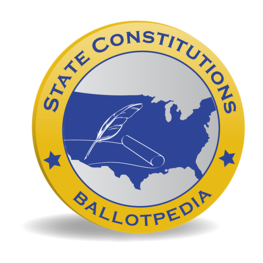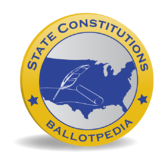Help us improve in just 2 minutes—share your thoughts in our reader survey.
Article V, Wisconsin Constitution
| Wisconsin Constitution |
|---|

|
| Preamble |
| Articles |
| I • II • III • IV • V • VI • VII • VIII • IX • X • XI • XII • XIII • XIV |
Article V of the Wisconsin Constitution is entitled Executive and consists of ten sections.
Section 1
As amended April 1979.
| Text of Section 1:
Governor; Lieutenant Governor; Term The executive power shall be vested in a governor who shall hold office for 4 years; a lieutenant governor shall be elected at the same time and for the same term.[1] |
1977 J.R. 32, 1979 J.R. 3, vote April 1979.
Section 1m
| Text of Section 1m:
Governor; 4−year Term |
Created April 1967; repealed April 1979; see 1965 J.R. 80, 1967 J.R. 10 and 15, vote April 1967; 1977 J.R. 32, 1979 J.R. 3, vote April 1979.[1]
Section 1n
| Text of Section 1n:
Lieutenant Governor; 4−year Term |
Created April 1967; repealed April 1979; see 1965 J.R. 80, 1967 J.R. 10 and 15, vote April 1967; 1977 J.R. 32, 1979 J.R. 3, vote April 1979.[1]
Section 2
| Text of Section 2:
Eligibility No person except a citizen of the United States and a qualified elector of the state shall be eligible to the office of governor or lieutenant governor.[1] |
Section 3
[As amended April 1967]
| Text of Section 3:
Election The governor and lieutenant governor shall be elected by the qualified electors of the state at the times and places of choosing members of the legislature. They shall be chosen jointly, by the casting by each voter of a single vote applicable to both offices beginning with the general election in 1970. The persons respectively having the highest number of votes cast jointly for them for governor and lieutenant governor shall be elected; but in case two or more slates shall have an equal and the highest number of votes for governor and lieutenant governor, the two houses of the legislature, at its next annual session shall forthwith, by joint ballot, choose one of the slates so having an equal and the highest number of votes for governor and lieutenant governor. The returns of election for governor and lieutenant governor shall be made in such manner as shall be provided by law.[1] |
1965 J.R. 45, 1967 J.R. 11 and 14, vote April 1967.
Section 4
| Text of Section 4:
Powers and Duties The governor shall be commander in chief of the military and naval forces of the state. He shall have power to convene the legislature on extraordinary occasions, and in case of invasion, or danger from the prevalence of contagious disease at the seat of government, he may convene them at any other suitable place within the state. He shall communicate to the legislature, at every session, the condition of the state, and recommend such matters to them for their consideration as he may deem expedient. He shall transact all necessary business with the officers of the government, civil and military. He shall expedite all such measures as may be resolved upon by the legislature, and shall take care that the laws be faithfully executed.[1] |
Section 5
| Text of Section 5:
Compensation of Governor |
Amended Nov. 1869 and Nov. 1926; repealed Nov. 1932; see 1868 J.R. 9, 1869 J.R. 2, 1869 c. 186, vote Nov. 1869; 1923 J.R. 80, 1925 J.R. 52, 1925 c. 413, vote Nov. 1926; 1929 J.R. 69, 1931 J.R. 52, vote Nov. 1932.[1]
Section 6
| Text of Section 6:
Pardoning Power The governor shall have power to grant reprieves, commutations and pardons, after conviction, for all offenses, except treason and cases of impeachment, upon such conditions and with such restrictions and limitations as he may think proper, subject to such regulations as may be provided by law relative to the manner of applying for pardons. Upon conviction for treason he shall have the power to suspend the execution of the sentence until the case shall be reported to the legislature at its next meeting, when the legislature shall either pardon, or commute the sentence, direct the execution of the sentence, or grant a further reprieve. He shall annually communicate to the legislature each case of reprieve, commutation or pardon granted, stating the name of the convict, the crime of which he was convicted, the sentence and its date, and the date of the commutation, pardon or reprieve, with his reasons for granting the same.[1] |
Section 7
As amended April 1979.
| Text of Section 7:
Lieutenant Governor, When Governor (1) Upon the governor’s death, resignation or removal from office, the lieutenant governor shall become governor for the balance of the unexpired term. (2) If the governor is absent from this state, impeached, or from mental or physical disease, becomes incapable of performing the duties of the office, the lieutenant governor shall serve as acting governor for the balance of the unexpired term or until the governor returns, the disability ceases or the impeachment is vacated. But when the governor, with the consent of the legislature, shall be out of this state in time of war at the head of the state’s military force, the governor shall continue as commander in chief of the military force.[1] |
1977 J.R. 32, 1979 J.R. 3, vote April 1979.
Section 8
As amended April 1979.
| Text of Section 8:
Secretary of State, When Governor (1) If there is a vacancy in the office of lieutenant governor and the governor dies, resigns or is removed from office, the secretary of state shall become governor for the balance of the unexpired term. (2) If there is a vacancy in the office of lieutenant governor and the governor is absent from this state, impeached, or from mental or physical disease becomes incapable of performing the duties of the office, the secretary of state shall serve as acting governor for the balance of the unexpired term or until the governor returns, the disability ceases or the impeachment is vacated.[1] |
1977 J.R. 32, 1979 J.R. 3, vote April 1979.
Section 9
| Text of Section 9:
Compensation of Lieutenant Governor |
Amended Nov. 1869; repealed Nov. 1932; see 1868 J.R. 9, 1869 J.R. 2, 1869 c. 186, vote Nov. 1869; 1929 J.R. 70, 1931 J.R. 53, vote Nov. 1932.[1]
Section 10
As amended Nov. 1908, Nov. 1930 and Apr. 1990.
| Text of Section 10:
Governor to Approve or Veto Bills; Proceedings on Veto (1)
(2)
(3) Any bill not returned by the governor within 6 days (Sundays excepted) after it shall have been presented to the governor shall be law unless the legislature, by final adjournment, prevents the bill’s return, in which case it shall not be law.[1] |
1905 J.R. 14, 1907 J.R. 13, 1907 c. 661, vote Nov. 1908; 1927 J.R. 37, 1929 J.R. 43, vote Nov. 1930; 1987 A.J.R. 71, 1989 S.J.R. 11, vote Apr. 1990.
See also
- State constitution
- Constitutional article
- Constitutional amendment
- Constitutional revision
- Constitutional convention
- Amendments
External links
- Wisconsin State Legislature, "Wisconsin Constitution"
- Wisconsin Historical Society, "Turning Points of Wisconsin History: The State Constitutions of 1846 and 1848"
Additional reading
- Stark, Jack. (2011). The Wisconsin State Constitution, New York, New York: Oxford University Press
- Janik, Erika. (2010). A Short History of Wisconsin, Madison, Wisconsin: Wisconsin Historical Society Press
- Stark, Jack. (1997). The Wisconsin State Constitution: A Reference Guide, Westport, Connecticut: Greenwood Publishing
| ||||||||||||||||
 |
State of Wisconsin Madison (capital) |
|---|---|
| Elections |
What's on my ballot? | Elections in 2025 | How to vote | How to run for office | Ballot measures |
| Government |
Who represents me? | U.S. President | U.S. Congress | Federal courts | State executives | State legislature | State and local courts | Counties | Cities | School districts | Public policy |

